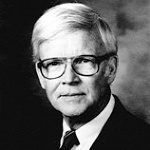Quotes about Self-Sufficiency
Self-sufficiency causes spiritual insensitivity.
It is significant that we are described as being slightly lower than the angels rather than being slightly higher than the beasts. Our place and privilege is to be a mediating figure, but to be one who looks up rather than down. When we sever the tie that binds us to God and try to cast off God’s rule, we do not rise up to take God’s place, as we desire to do, but rather sink to a more bestial level. In fact, we come to think of ourselves as beasts (“the naked ape”) or, even worse, as machines.
Taken from “Foundations of the Christian Faith-Book I” by James Montgomery Boice, page 155. (c)1986 InterVarsity Christian Fellowship of the USA, Revised edition. Used by permission of InterVarsity Press, P.O. Box 1400, Downers Grove, IL 60515. www.ivpress.com http://www.gospelcom.net/cgi-ivpress/book.pl/code=991. Get this book!
For men have no taste for [God’s power] till they are convinced of their need of it and they immediately forget its value unless they are conditionally reminded by awareness of their own weakness.
Calvin’s New Testament Commentaries, 2 Corinthians, Timothy, Titus, Philemon, Eerdmans, www.eerdmans.com, 1964, p. 161.
The difference between grace and works is the difference between worship and idolatry. The man inebriated with the thought that all he has is Yahweh’s gift finds himself repeatedly on his knees, adoring, thanking, praising. But if we do not grasp grace we plummet into idolatry, for that is the inevitable corollary of self-sufficiency.
1 Samuel, Focus, 1998, p. 318. Get this book!
God is not looking for gifted people or people who are self-sufficient. He is looking for inadequate people who will give their weakness to Him and open themselves to the ministry of the Holy Spirit and the transforming grace of the new covenant as it is ministered by Christ Jesus Himself.
Sufficient for Ministry by Kent Hughes taken from 2 Corinthians by Kent Hughes, copyright 2006, Crossway Books, a division of Good News Publishers, Wheaton Illinois 60187, www.crosswaybooks.org, p. 74.
P.T. Forsyth once said, “The worst sin is prayerlessness.” We usually think of murder, adultery, or theft as among the worst. But the root of all sin is self-sufficiency, independence from God. When we fail to wait prayerfully for God’s guidance and strength, we are saying, with our actions if not our lips, that we do not need Him. How much of our service is characterized by “going it alone?”
When a man thinks he has got a good deal of strength, and is self-confident, you may look for his downfall. It may be years before it comes to light, but it is already commenced.
To suppose that whatever God requireth of us that we have power of ourselves to do, is to make the cross and grace of Jesus Christ of none effect.
The great mistake made by most of the Lord’s people is in hoping to discover in themselves that which is to be found in Christ alone.
The Doctrine of Sanctification, Bible Truth Depot, 1955, p. 200.
Get this book!
God’s first great design in all our trouble is that we might let go of self-confidence. When we do that, there is a temporary sense of falling. But by faith in God’s mercy, we land, infinitely more secure, in the arms of our Father, who is utterly in control at the brink of life and death.
A cry for help from the heart of a childlike believer is sweet praise in the ears of God. Nothing exalts Him more than the collapse of self-reliance which issues in passionate prayer for help. “Call upon me in the day of trouble; I will deliver you, and you shall glorify me” (Ps. 50:15). Prayer is the translation into a thousand different words of a single sentence: “Apart from me [Christ] you can do nothing” (John 15:5).
We are hardwired to trust in ourselves. That’s not good for us or the God-glorifying purpose for which God created us. Therefore, suffering is used to break us of self whereby we might trust more deeply in God. So God’s intent in suffering is not to pull us away from Him as many people seem to believe, but rather draw us closer to Him. And the more He strips us during affliction of our human resources and excuses and justifications and easy way outs, the more we will run to Him and cling to Him as the only thing we’ve got.
Therefore when the trial comes (and often remains), we understand that while in the trial we are being firmly held in His wise and loving arms. As the trial humbles us, it manifests a weakness in us that causes us to cast a greater dependence on Him. We are forever weaned of our self-sufficiency and our self-reliance and learn to trust in His resources and not our own. God provides perfectly measured, sufficient grace (His divine assistance through the Holy Spirit) enabling us to remain in the trial with our faith intact. We are enabled to depend more on His strength and not our own. And we are enabled to trust Him for the working of Christlikeness in our lives (Jas. 1:2-4).
Are you glorying in your graces or your talents? Are you proud of yourself, that you have had holy postures and sweet experiences?… Your flaunting poppies of self-conceit will be pulled up by the roots, your mushroom graces will wither in the burning heat, and your self-sufficiency shall become as straw for the manure pile. If we forget to live at the foot of the cross in deepest lowliness of spirit, God won’t forget to make us feel the pain of His rod.
Self-sufficiency is Satan’s net, wherein he catches men, like poor silly fish, and does destroy them. Be not self-sufficient. Think yourselves nothing, for you are nothing, and live by God’s help. The way to grow strong in Christ is to become weak in yourself. God pours no power into man’s heart till man’s power is all poured out. Live, then, daily, a life of dependence on the grace of God. Do not set yourself up as if you want an independent gentleman; do not start in your own concerns as if you could do all things yourself; but live always trusting in God. You have as much need to trust Him now as ever you have; for, mark this, although you would have been damned without Christ, at first, you will be damned without Christ now, unless He still keeps you.
Self-sufficient Christians are weak, easily deceived, ineffective in service, easily angered, over-confident, and ruled by their emotions. Insufficient Christians, who know they can do nothing outside the power and strength that Christ gives, are actually strong, because the power of God flows through their utter dependence on Him.
It is foolish for humans, including God’s people, to imagine that they are self-sufficient. God does not help those who help themselves. Rather, He helps those who cannot help themselves, know it, and rely on Him.













